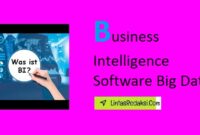Who Uses Business Intelligence Software? – Business intelligence (BI) software is like a high-tech magnifying glass—helping people see the details that matter in their data. But who uses this powerful tool? Let’s break it down so you can understand exactly who’s benefiting from BI software today.
Daftar Isi
Who’s Using Business Intelligence Software?
Business intelligence software isn’t just for tech giants and big corporations. It’s like a compass for businesses of all sizes, helping them navigate through mountains of data. But who exactly is using this powerful tool? Let’s break it down.
Businesses Small, Mid-Sized, and Big
First off, businesses of all sizes are using BI software. From mom-and-pop shops to multi-national corporations, everyone wants to turn data into decisions. Small businesses use BI to track sales, find trends, and make smart choices that can lead to growth. Meanwhile, big companies harness BI to manage large volumes of data and streamline operations worldwide. It’s like having a roadmap when navigating through a forest of numbers.
Small Businesses: The Data-Driven Dreamers
Small business owners wear many hats. From marketing to finances, they juggle a lot. BI Software for small businesses helps them make sense of their operations. Imagine trying to cook a new recipe without directions—frustrating, right? BI tools act as that handy guide, helping small businesses spot trends and understand customer behavior. With the right insights, they can make smarter decisions that drive growth.
See Also: Business Intelligence Software for Apps
Mid-Sized Companies: The Growth Seekers
Mid-sized companies often find themselves at a crossroads. They’ve outgrown their initial strategies but aren’t quite ready for full-scale enterprise solutions. This is where business intelligence shines. It provides clarity. Suppose a mid-sized company notices sales dipping in a specific region. With BI Software for mid-sized companies, they can analyze the data, find the root cause, and adjust their strategy quickly. It’s like having a radar for potential pitfalls.
Large Enterprises: The Data Giants
In large enterprises, data flows in from every direction, like a busy highway. BI Software for large enterprises helps these giants make sense of it all. It’s crucial for decision-makers who need to pull reports and analyze vast amounts of information. For them, BI isn’t just a luxury; it’s a necessity. Think of it as having a personal trainer for data—keeping everything in check and pushing for better performance.
Marketing Teams: The Creative Analysts
Next up, let’s talk about marketing teams. BI Software for marketing teams helps marketers understand their audience better. By analyzing data from social media, website traffic, and customer feedback, they can spot trends and adjust strategies. Imagine trying to hit a bullseye in a dart game without knowing where the target is. BI helps marketers see that target clearly, enabling them to score hits rather than misses.
So, marketing teams are all about understanding their audience. They want to know what makes people tick. Business intelligence tools allow them to analyze customer data and campaign performance. It’s like having a magnifying glass that reveals hidden patterns. With these insights, marketers can fine-tune their strategies, ensuring their messages hit the right note.
Read Also: Business Intelligence Analyst Software
Sales Professionals
Sales professionals are also heavy users of BI software. They need to track leads, understand customer behavior, and keep an eye on sales performance. With BI Software for sales professionals, they can identify which products fly off the shelves and which ones sit collecting dust. It’s like having a secret weapon that tells you exactly where to aim your efforts to close deals.
Financial Analysts: The Number Crunchers
For financial analysts, data is their currency. Business intelligence software gives them the tools to track expenses, revenue, and forecasts. Imagine trying to connect the dots in a complex puzzle—BI simplifies this process. It helps analysts provide accurate reports, which are vital for budgeting and financial planning.
So, financial analysts rely on BI software to make sense of numbers and trends in the financial world. They crunch data on income, expenses, and market performance to forecast future trends. It’s a bit like looking into a crystal ball—only instead of magic, they use data analysis to predict what might happen next. This helps companies stay ahead and prepare for changes in the market.
Human Resources Teams
HR teams use BI software too. With tools that track employee performance, satisfaction, and turnover rates, they can see what’s working and what isn’t. This insight allows HR to engage employees better, improve hiring processes, and create a positive workplace culture. Think of it as a health checkup for the company’s biggest asset: its people.
See Also: Business Intelligence Software Big Data
Operations Managers: The Efficiency Seekers
Operations managers are focused on streamlining processes. They’re always on the lookout for ways to boost efficiency. Business intelligence software helps them identify bottlenecks and improve workflows. It’s like having a GPS for operations, guiding managers to the fastest route for success.
Healthcare Providers: The Patient-Centric Professionals
Surprisingly, the healthcare sector has also embraced BI software. Hospitals and clinics use it to manage patient data, improve care quality, and reduce costs. By analyzing trends in patient care and outcomes, healthcare providers can make informed decisions that lead to better health services. In a way, BI is like a lifeline, guiding medical decisions toward better outcomes.
So, in the healthcare sector, data plays a pivotal role. Business intelligence tools help healthcare providers analyze patient data, operational efficiency, and treatment outcomes. By harnessing this information, they can improve patient care. It’s akin to having a pulse on the organization, ensuring that every decision is informed and patient-centric.
E-commerce and Retail
In the e-commerce and retail space, BI software is crucial. Businesses analyze shopping patterns, inventory levels, and customer preferences to optimize their offerings. It’s like tuning an instrument to get the perfect sound; this fine-tuning helps retailers create a shopping experience that keeps customers coming back.
Retailers are always looking for ways to enhance the shopping experience. Business intelligence helps them understand inventory levels, customer preferences, and sales trends. Think of it as having a crystal ball—retailers can predict what products will fly off the shelves and make smart inventory decisions.
Conclusion: A Tool for Every Industry
Business intelligence software offers invaluable insights across various industries. From small startups to large corporations, different professionals use these tools to make informed decisions. Whether it’s improving customer experiences, enhancing operational efficiency, or boosting sales, BI software is reshaping how businesses operate. In a world driven by data, those who harness it will always stay one step ahead.
So, BI software is no longer just for tech giants; it’s a tool that various professionals across different industries use daily. By transforming raw data into actionable insights, it helps everyone— from business owners to marketers, salespeople, financial analysts, HR professionals, retailers, and healthcare providers—make smarter decisions. Who knew that something so complex could have such broad appeal? In the end, BI software isn’t just about numbers; it’s about finding clarity in a sea of data.



